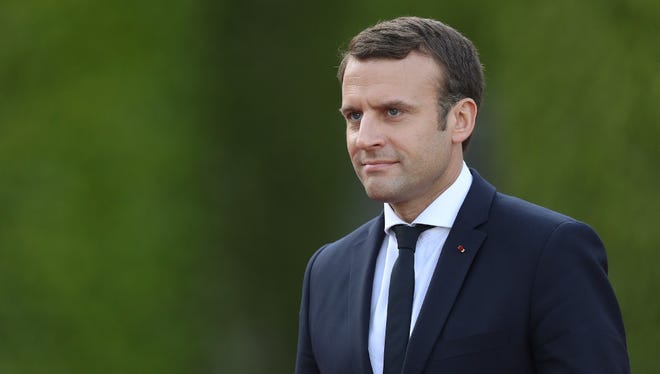France's Macron will likely do better than fellow political novice Donald Trump
Inexperience doesn't matter as much as temperament and the ability to unlearn past skills.

PARIS — French president Emmanuel Macron and his political party dominated by electoral novices scored an unassailable margin in France's parliament in Sunday's national elections. He’s now cleared the way for the kind of revolutionary social, economic and political transformation President Trump so desperately seeks — and now seems increasingly unlikely to attain.
But just as in Washington there may be lots more here in Paris than meets the eye.
In both France and the United States, voters have rejected career politicians and opted for presidents, and now legislators, with resumes that have little or no political flavor. About three-quarters of the new French parliament will be neophytes who, like Macron and of course Trump, are new to their office.
Indeed, one of Macron’s principal opponents on the far left, Jean-Luc Melenchon, proclaimed Sunday evening that despite an apparently overwhelming victory, Macron “does not have the legitimacy to perpetrate the social coup d’état” that he clearly has been contemplating.
Macron certainly has the resume of a French president. He was a top honors graduate of the elite Ecole National d’Administration (ENA) where the bulk of French presidents over the past half century passed through. He served as a Minister of Finance under his predecessor, the socialist Francois Hollande. And he had enough political savvy to cobble together from scratch his own political party in just 15 months.
France rejects 'high priestess of fear': Our view
Pulling out of Paris climate agreement kills U.S. leadership
None of this, however, guarantees political success. I’ve had the good fortune to teach at the ENA in years past. Each of my students — in the “Intensive Spring Course” — was unquestionably brilliant. But none had the deep intellectual curiosity or flexibility, nor in particular the desire, to question what was being taught. “It is not for us to question you, monsieur le professeur, but to write down what you tell us and repeat it effectively on our exams,” one student finally confessed to me after I’d sought to engage the class in an intellectual give-and-take.
This might work well in the Trump White House and might have worked well for French presidents of the past. But today it is hardly a recipe for effective leadership of a troubled nation or, in the case of Macron and his aspirations, the continent of Europe.
Success ultimately may depend less on a leader's education or resume and far more on his or her temperament. And it may hinge, as well, as much on the skills unlearned as those learned. Some of the key attributes of leadership include flexibility and a willingness to negotiate, an understanding of how to avoid the far too prevalent political disease whose symptom is hubris, and above all a sensitivity to those one rules. Through the years I’ve run across a scattered few who managed to internalize and deploy a collection of these attributes.
POLICING THE USA: A look at race, justice, media
Cuba policy travels the wrong way
Thailand’s King Bhumibol Adulyadej, at his death last year the world’s longest-serving head of state, won the adoration of his people and managed to maintain his nation’s fierce independence during the decades that a virulent communist insurgency raged next door in Indochina. I’ve traveled with him in remote northern Thailand when tens of thousands of his subjects knelt for hours by the side of the narrow jungle road, candles held to their faces, so their ruler might see them when his motorcade flew past.
The current King of Jordan, Abdullah II and his father, King Hussein, cared profoundly for the well-being of their own people, while demonstrating their deep-seated humanity to fellow Arabs by welcoming hundreds of thousands of refugees from neighboring wars in Syria, Iraq and beyond.
These rulers and others in charge of their nations today, from German chancellor Angela Merkel to Canada’s Justin Trudeau, all with vastly disparate resumes, have managed to exhibit and deploy traits that go far beyond any line item on a political resume. Macron, too, seems at first blush at least to understand what a substantial number of his people seem to want from their 39-year-old leader — namely to assure themselves of a secure and financially strong future.
Both Macron, the former banker, and Trump, the real estate magnate, now have firm majorities of their own party in their legislatures that should allow them to govern effectively. But if Macron is to succeed and if Trump is to escape the sickening downward spiral that is pulling in his closest family and supporters, both will need to understand how to listen carefully to what their people — all their people — want, then adjust their programs and priorities accordingly.
David A. Andelman, member of the board of contributors of USA Today, is the author of "A Shattered Peace: Versailles 1919 and the Price We Pay Today." He formerly served as Paris correspondent for CBS News. Follow him on Twitter@DavidAndelman.
You can read diverse opinions from our Board of Contributors and other writers on the Opinion front page, on Twitter @USATOpinion and in our daily Opinion newsletter. To submit a letter, comment or column, check our submission guidelines.